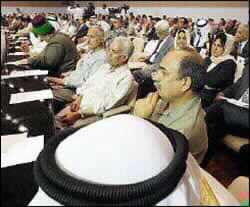Iraqi MPs held a special session to discuss US threats to topple President Saddam Hussein's regime, in the wake of the US rejection of two new arms initiatives and Kofi Annan's insistence that Baghdad implement Security Council resolutions on UN terms.
The parliament convened Wednesday for the second such emergency meeting in a month, and a day after the UN chief told Iraq it must confirm it will comply with UN Security Council Resolution 1284, approved in 1999.
"I look forward to receiving from your government a confirmation that it accepts the sequence of steps outlined above, along with a formal invitation" to UN weapons inspectors, Annan said in a letter sent to Iraqi Foreign Minister Naji Sabri with copies to all Security Council ambassadors on Tuesday.
"It is my sincere hope that a speedy resumption of inspections will help facilitate the resolution of all outstanding issues."
Annan's letter emphasizes that Iraq must comply with every point of Resolution 1284, especially noting "the key remaining disarmament tasks to be completed by Iraq."
With Iraq increasingly the target of US threats of a military campaign, Sabri extended an invitation Thursday to chief weapons inspector Hans Blix to Baghdad for talks on the possible resumption of weapons inspections, which were halted in 1998.
Blix ruled out a visit, saying such talks would "raise expectations without foundation".
The White House also dismissed outright a second invitation from Baghdad to the US Congress to send a fact-finding team to investigate any Iraqi development of weapons of mass destruction.
US preparations for war against Iraq, which has been under crippling UN sanctions since invading Kuwait in 1990, are meanwhile showing no sign of slacking, despite mounting concern among US allies in Europe and the Middle East.
Army General Tommy Franks, the commander of US forces in the Gulf, briefed President George W. Bush at the White House Monday on a new plan for a significantly slimmed down invasion force, The Wall Street Journal reported Tuesday.
The plan appeared to be the latest instalment in a series of military options explored by the Pentagon for ousting Saddam Hussein.
The outline presented by Franks was in line with a proposal for an invasion force 50,000 to 80,000-strong backed by heavy air power that has gained support among Bush administration officials.
But German Chancellor Gerhard Schroeder on Wednesday stressed his strong reservations about an eventual military attack on Iraq.
"This fight (against terror) is not yet won and that is why I am warning against an attack on Iraq," he said in the German tabloid Bild.
"It will not be well understood as a means of defence and could destroy the international alliance against terrorism.
"The Middle East needs a new peace and not a new war. That is the aim of our policy. And it is only that which corresponds with the political and economic necessities," Schroeder said.
PHOTO CAPTION
Iraqi MPs attend a session of the Iraqi National Assembly in Baghdad, AUG 7, 2002.
- Author:
AFP - Section:
WORLD HEADLINES


 Home
Home Discover Islam
Discover Islam Quran Recitations
Quran Recitations Lectures
Lectures
 Fatwa
Fatwa Articles
Articles Fiqh
Fiqh E-Books
E-Books Boys & Girls
Boys & Girls  Hajj Rulings
Hajj Rulings Hajj Fatwas
Hajj Fatwas














